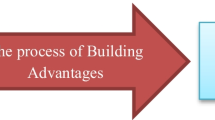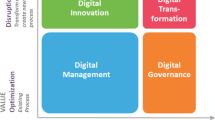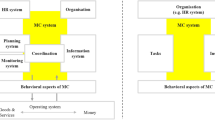Abstract
This paper presents an investigation of management accounting in four major Italian universities, which have been struggling to build their strategy in a context of significant change. Following many OECD countries the Italian government has been changing its higher education system by giving more autonomy to universities. These changes pose a number of challenges for management and accounting systems in Italian Universities. Drawing on self-referential theory and its applications to accounting research the paper analyses the construction of Strategic Management Accounting (SMA) in four Italian universities, which are immersed in a similar context of change. The focus is specifically on two aspects of decisions: (1) resource allocation and (2) new academic programme.





Similar content being viewed by others
Notes
The Chamber of Commerce is a local institution representing industries.
National analysis of occupational profiles of graduates. Website: www.almalaurea.it.
Universities annually must transmit to the Ministry of Education (Miur) and to the National Evaluation Committee (CNVSU) a set of data, mainly concerning information about characteristics of teaching activities (number of students, number of teachers, number of administrative staff, etc.). For more details, see the website www.cnvsu.it, and in particular the document no. 04/04 (CNVSU, 2004).
References
Brignall, S., & Ballantine, J. (2004). Strategic enterprise management system: New directions for research. Management Accounting Research, 15, 225–240.
Bromwich, M. (1990). The case for strategic management accounting: The role of accounting information for strategy in competitive markets. Accounting, Organizations and Society, 15(1–2), 27–46.
Bromwich, M., & Bhimani, A. (1994). The strategic dimension. In Management accounting: Pathways to progress (chap. 5, pp. 125–149). London: The Chartered Institute of Management Accountants.
Choe, J. M. (2004). The relationships among management accounting information, organizational learning and production performance. Journal of Strategic Information System, 13, 61–85.
CNVSU (Comitato Nazionale di Valutazione per il Sistema Universitario). (2004). Note tecniche su dati ed informazioni da trasmettere entro il 30 aprile 2004, document no. 04/05. Roma: Ministero dell’Istruzione, dell’Università e della Ricerca.
Cunningham, G. M. (1992). Management control and accounting systems under a competitive strategy. Accounting, Auditing and Accountability Journal, 5(2), 85–102.
Cunningham, G. M., & Harris, J. E. (2001). Towards a theory of performance reporting in achieving public sector accountability: A field study. Fifth international research symposium on public management, Barcelona.
Denzin, N. K. (1978). The research act (2nd edn). New York: McGraw-Hill.
DiMaggio, P. J., & Powell, W. W. (1983). The iron cage revisited: Institutional isomorphism and collective rationality in organisational fields. American Sociological Review, 48(April), 147–160.
Dubois, A. (2003). Strategic cost management across boundaries of firm. Industrial Marketing Management, 32, 365–374.
Guilding, C., Cravens, K. S., & Tayles, M. (2000). An international comparison of strategic management accounting practices. Management Accounting Research, 11, 113–135.
Hood, C. (1991). A public management for all seasons? Public Administration, 69, 3–19.
Hood, C. (1995). The new public management in the 1980s: Variations on a theme. Accounting Organizations and Society, 20(2/3), 93–110.
Johnson, H., & Kaplan, R. (1987). Relevance lost: The rise and fall of management accounting. Boston: Harvard Business School Press.
Kaplan, R. S. (1983). Measuring manufacturing performance: A new challenge for managerial accounting research. Accounting Review, 58(4), 686–705.
Kaplan, R. S. (1984). Yesterday’s accounting undermines production. Harvard Business Review, 62, 95–101.
Kaplan, R. S. (1988). One cost system is not enough. Harvard Business Review, 66, 61–66.
Kaplan, R. S. (1994). The evolution of management accounting. The Accounting Review, 69(3), 390–418.
Lord, B. R. (1996). Strategic management accounting: the emperor’s new clothes? Management Accounting Research, 7, 347–366.
Maturana, H. M., & Varela, F. G. (1980). Autopoiesis and cognition: The realization of the living. Dordrecht: Reidel.
Mingers, J. (1995). Self-producing systems: Implications and applications of autopoiesis. New York: Plenum.
Morgan, G. (1988). Accounting as reality construction: Towards a new epistemology for accounting practice. Accounting, Organizations and Society, 13(5), 477–485.
OECD. (2003). Education policy analysis. Paris: OECD.
Roslender, R. (1996). Relevance lost and found: Critical perspectives on the promise of the management accounting. Critical Perspective on Accounting, 7, 533–561.
Roslender, R., & Hart, S. (2002). Integrating management accounting and marketing in the pursuit of competitive advantage: The case for strategic management accounting. Management Accounting Research, 13, 255–277.
Roslender, R., & Hart, S. (2003). In research of strategic management accounting: Theoretical and field study perspectives. Management Accounting Research, 14, 255–279.
Seal, W. (2001). Management accounting and the challenge of strategic focus. Management Accounting Research, 12, 487–506.
Simmonds, K. (1981). Strategic management accounting. Management Accounting, 59, 26–29.
Simmonds, K. (1982). Strategic management accounting for pricing: A case example. Accounting and Business Research, 12, 206–214.
Yin, R. K. (1994). Case study research: Design and methods. London: Sage.
Acknowledgements
We are grateful to MIP—Business School of Politecnico di Milano for the financial support of this study that is included in a wider research project which aim is to evaluate efficiency and effectiveness of universities activities.
Author information
Authors and Affiliations
Corresponding author
Additional information
A preliminary version of this paper was presented at the 28th European Accounting Association Annual Conference, in Gothenburg (18–20th May 2005). We’re grateful to discussants for their useful suggestions.
Rights and permissions
About this article
Cite this article
Agasisti, T., Arnaboldi, M. & Azzone, G. Strategic management accounting in universities: the Italian experience. High Educ 55, 1–15 (2008). https://doi.org/10.1007/s10734-006-9032-6
Received:
Accepted:
Published:
Issue Date:
DOI: https://doi.org/10.1007/s10734-006-9032-6




